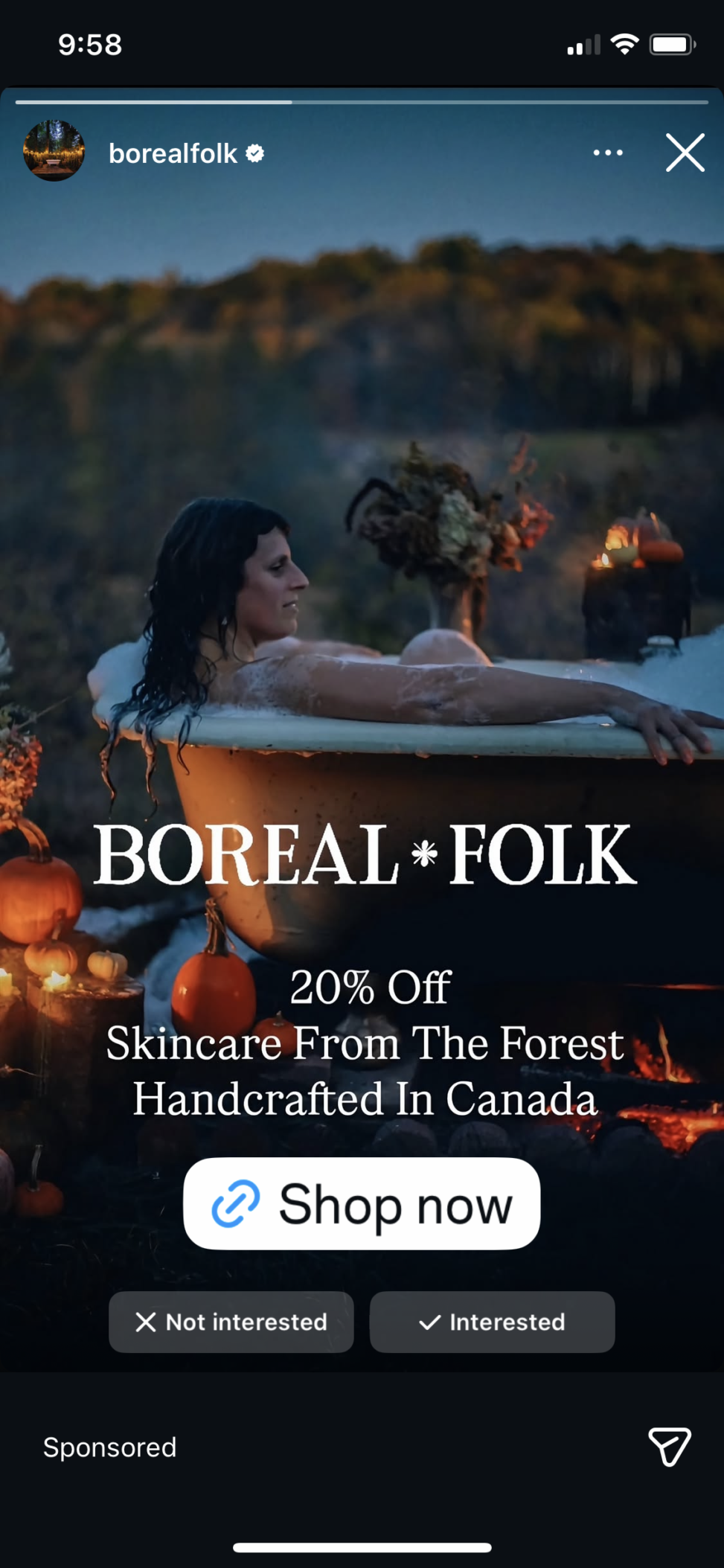An advertisement that appeared on my phone this week was a sponsored ad, shown between Instagram stories, promoting natural skincare from Boreal Folk. The image presents a woman sitting in a bubble-filled bathtub in a field, surrounded by candles, pumpkins, and floral arrangements. The lighting is soft and dim, lit mainly by the remnants of the sun and the orange glow of candles. This image uses a majority of complimentary cool tones with highlights of warm tones. This creates visual excitement and a feeling of balance. The warm tones are surrounding the figure, which guide the eye to focal points of the woman and the objects surrounding her. The point of view is looking at the subject from a side profile a few feet away. She has a slight smirk on her face as she stares off of the right side of the image. She does not acknowledge the viewer’s gaze, unaware in her own world. It elicits that you are viewing a private experience. Compositionally, the woman’s body is partially cut off from view. Her face, shoulder, arm, hand and knee are poking out of the bathtub bubbles. This creates the feeling that the environment she is experiencing has equal importance with the woman herself. It is marketed towards women due to these qualities. Women viewing the ad could see themselves transported to this scene once purchasing and using the products. They are selling not only a product, but a feeling of peace and a connection with nature.
The imagery and text create an assumption that this skincare is natural and beneficial for the consumer and environment. Greenwashing comes into effect by using marketing strategies to appeal to consumers values.1 This company uses images of nature to create an association that their products are environmentally conscious. A common strategy used in greenwashing is vague wording, which allows a vast range of interpretations and conclusions.2 The wording is carefully chosen to make the consumer believe a vague statement that, while true, does not speak to the green attributes of the company or product.3 The specific buzz words on the advertisement are “skincare from the forest handcrafted in Canada.” Specifically, the word “handcrafted” creates an assumption of a small-scale company, using ingredients that can be harvested by hand and sourced by the company themselves. It makes the company and product appear more trustworthy and ethical, both from an environmental and labor perspective. Key words that evoke connections to environmentally green practices, do not equate as such.4 The vague language Boreal Folk used in their advertisement points the viewer to make conclusions about the environmental practices and impacts from the company.
The ad was successful in appealing to me, in aesthetic, values, and advertisement form. I am Canadian, value supporting artists and small businesses, use Instagram, believe in natural medicine and I am consistently trying to make healthier choices for my body and the planet. Specifically impactful was the medium of Instagram as the marketing vessel. It creates a seamless interaction between social media usage and shopping. The ad was specifically effective because it had consistency between the product purpose and display of its use.5 Seo, Sung, and Yoon’s 2024 study explored advertising effectiveness in terms of two distinct product types: utilitarian and hedonic.6 Utilitarian products focus on functional practices uses while hedonic are more pleasure focused products. When advertised in agreement to these types, such as the utilitarian product being shown in a task focused manner and the hedonic in how it creates an enjoyable experience, consumers responded more positively to the ad and found it less intrusive.7 This in turn increases the effectiveness of sponsored ads on Instagram by creating improved attitudes and more openness to purchase from that advertisement.8 Boreal Folks’ product is a hedonic, pleasure-focused, luxury skincare that visually sold a tranquil experience alongside, for an ad that was more easily accepted psychologically.
Boreal Folk’s advertisement social agenda was to convince me to purchase their skincare, through environmental, personal, political and economic means. They state a discounted sale as well, enticing the capitalist agenda of making consumers feel as though they are saving money by spending it. They eject that it will be an ethical purchase because it is from Canada, which encourages promoting the local economy and further, creates a sense of comradery between the company and Canadian consumer. Through their vague wording and associated imagery, the company appears “natural” and made by hand with locally sourced ingredients. Overall, the social message was that the consumer will feel tranquility and a stronger connection to nature and themselves by using their products.
Notes
1. Anis Ur Rehman et al., “Role of Greenwashing in Influencing Brand Attitude and Consumption: Identifying Sustainable Business Strategies,” Business Strategy and the Environment 34, no. 6 (2025): 6687, https://doi.org/10.1002/bse.4300
2. Anis Ur Rehman et al., “Role of Greenwashing in Influencing Brand Attitude and Consumption: Identifying Sustainable Business Strategies,” Business Strategy and the Environment 34, no. 6 (2025): 6689, https://doi.org/10.1002/bse.4300
3. Anis Ur Rehman et al., “Role of Greenwashing in Influencing Brand Attitude and Consumption: Identifying Sustainable Business Strategies,” Business Strategy and the Environment 34, no. 6 (2025): 6689, https://doi.org/10.1002/bse.4300
4. Anis Ur Rehman et al., “Role of Greenwashing in Influencing Brand Attitude and Consumption: Identifying Sustainable Business Strategies,” Business Strategy and the Environment 34, no. 6 (2025): 6689, https://doi.org/10.1002/bse.4300
5. Jinhee Seo et al., “‘It doesn’t bother me that much’: The congruence effect of product types and ad appeals on the effectiveness of sponsored ads on Instagram,” Journal of Business Research, Volume 185 (2024): 4, https://doi.org/10.1016/j.jbusres.2024.114910.
6. Jinhee Seo et al., “‘It doesn’t bother me that much’: The congruence effect of product types and ad appeals on the effectiveness of sponsored ads on Instagram,” Journal of Business Research, Volume 185 (2024): 1-11, https://doi.org/10.1016/j.jbusres.2024.114910.
7. Jinhee Seo et al., “‘It doesn’t bother me that much’: The congruence effect of product types and ad appeals on the effectiveness of sponsored ads on Instagram,” Journal of Business Research, Volume 185 (2024): 4, https://doi.org/10.1016/j.jbusres.2024.114910.
8. Jinhee Seo et al., “‘It doesn’t bother me that much’: The congruence effect of product types and ad appeals on the effectiveness of sponsored ads on Instagram,” Journal of Business Research, Volume 185 (2024): 7, https://doi.org/10.1016/j.jbusres.2024.114910.
Bibliography
Rehman, Anis U., Sushant Kumar, Rsha Alghafes, Laura Broccardo, Ajay Kumar Patel. “Role of Greenwashing in Influencing Brand Attitude and Consumption: Identifying Sustainable Business Strategies.” Business Strategy and the Environment 34, no. 6 (2025).
Seo, Jinhee, Yoon Hi Sung, and Doyle Yoon. “‘It doesn’t bother me that much’: The congruence effect of product types and ad appeals on the effectiveness of sponsored ads on Instagram.” Journal of Business Research, Volume 185 (2024): 1-11.
https://doi.org/10.1016/j.jbusres.2024.114910.


Sheyanne McCauley
In this analysis, Leah does an excellent job at looking beyond what the advertisement is trying to sell and acknowledging what they might not be saying about their products when it comes to sustainability. She highlights who the target audience is and what lifestyle Boreal Folk is trying to sell to them. The advertisement is broken down clearly by looking at what makes something greenwashing, such as vague wording and language, which can be seen in the advertisement. Besides Boreal Folk trying to appeal to the audience through environmental benefits, Leah also notices that the company is trying to win over the audience through political and economic means as they mention that their company is Canadian. She uses scholarly sources to emphasize that Boreal Folk is trying to sell a desired lifestyle by showing someone in the advertisement using the products in a certain way. From utilitarian products and hedonic products, she notices that Boreal Folk utilizes hedonic products (selling the experience). The only thing I think that is missing from this analysis is a deeper look into the company themself; if their claims of having handcrafted Canadian products are accurate or if they are instead exploiting workers in other countries and only manufacturing part of the product in Canada. Overall, Leah gives a thorough look into this advertisement and the greenwashing that Boreal Folk is displaying.